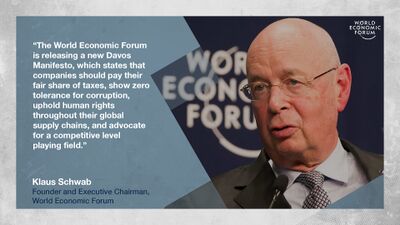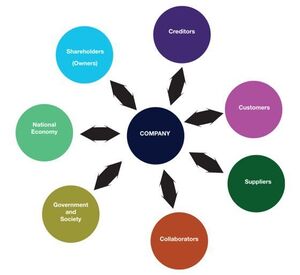Stakeholder
 | |
| Interest of | André Hoffmann |
| Technocratic term giving the impression of democracy. | |
A stakeholder is a person or group who gets to give input into a decision-making process, but without actually making the decisions.
Stakeholder is originally a word from gambling, and refers to someone who has bet something, who has a share in the pot.
Noticeably lacking from the concept of stakeholders is any mention of democracy, and instead it focuses on technocratic terms such as "good management", "anti-corruption efforts" and similar. The concept is much beloved by think tanks and NGOs, as it gives the impression of people's participation (conveniently with the same NGOs an representatives), while in reality giving the decision-making power to their rich and powerful backers. Interestingly, the model also makes most smaller business leaders into shop managers for the owners of the world.
Stakeholder capitalism
The World Economic Forum is at the forefront of transforming capitalism from "shareholder capitalism" to "stakeholder capitalism". Using grand promises of improving the world, it is in reality a power grab.
In the WEF's thinking, each corporation has its stakeholders, each represented by a circle around the perimeter, with the corporation in the middle. Multi-stakeholder then means - still in WEF's language - the group of all stakeholders. The figure expresses the three key elements in WEF's thinking. Multi-stakeholder structures do not mean that all stakeholders is intended to play the same role, it is the corporation that is at the center of the process, and WEF's multi-stakeholders are first and foremost those who have commercial ties to the group: customers, creditors, suppliers, partners, owners and the national economy. All other possible stakeholders are grouped together as "government and society[1].
The core of what WEF stands for can be expressed in the composition of multi-stakeholder governance. Governance in this context does not mean government, but rule, leadership, domination. But it is not the governments that will rule, but the corporation with their multi-stakeholders.[1]
